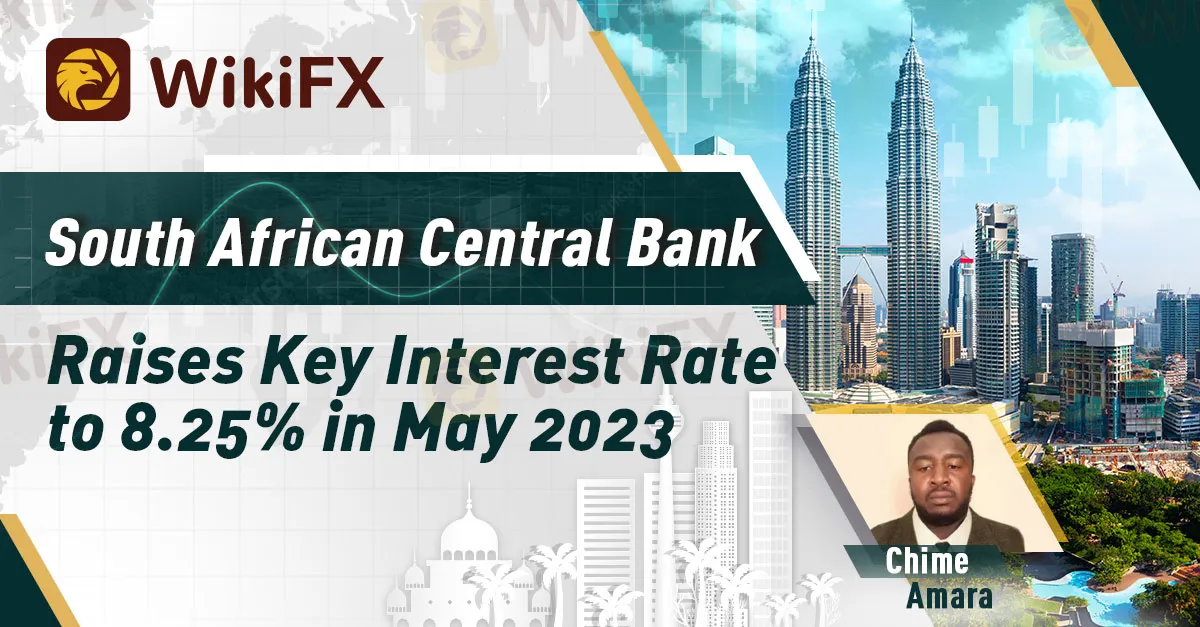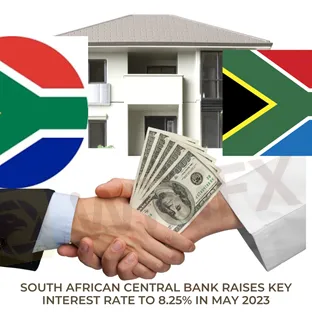简体中文
繁體中文
English
Pусский
日本語
ภาษาไทย
Tiếng Việt
Bahasa Indonesia
Español
हिन्दी
Filippiiniläinen
Français
Deutsch
Português
Türkçe
한국어
العربية
South African Central Bank Raises Key Interest Rate to 8.25% in May 2023
Abstract:In a bid to contain the rising inflation rate, South African Reserve Bank (SARB) raised its key interest rate by 50 basis points to 8.25% in May 2023 marking its highest level since 2009.

By: Chime Amara

The South African Reserve Bank (SARB) raised its key interest rate by 50 basis points to 8.25% in May 2023, to contain inflation the country's high inflation rate. The move was the tenth consecutive rate hike by the SARB, and brings the repo rate to its highest level since 2009.
In a statement, the SARB said that the decision to raise rates was taken in light of the “continued high levels of inflation” in South Africa. Inflation in South Africa rose to 6.5% in April, well above the SARB's target range of 3% to 6%.
The SARB said that it expects inflation to remain elevated in the near term, but that it should start to decline in the second half of 2023. The bank further stated that it remains committed to bringing inflation down to its target in 2023.
The rate hike is likely to have a significant impact on the South African economy. Higher interest rates will make it more expensive for businesses to borrow money, which could lead to slower economic growth. However, the rate hike could also help to cool inflation, which would benefit consumers.
The rand, the South African currency, fell sharply after the rate hike, hitting a record low against the US dollar. The rand has been under pressure in recent months due to several factors, including the country's high debt levels and political uncertainty.
Overall, the rate hike is a good sign that the SARB is taking inflation seriously. However, it remains to be seen whether the rate hikes will be enough to bring inflation under control. The SARB will likely continue to monitor inflation closely in the coming months and may raise rates further if necessary.

Disclaimer:
The views in this article only represent the author's personal views, and do not constitute investment advice on this platform. This platform does not guarantee the accuracy, completeness and timeliness of the information in the article, and will not be liable for any loss caused by the use of or reliance on the information in the article.
Read more

Will natural disasters have an impact on the forex market?
The forex market is known for its rapid responses to global events, but the influence of natural disasters, such as earthquakes and typhoons, can be less straightforward. While headlines may scream about catastrophic damage and economic disruption, the long-term effects on currency values often depend on a blend of immediate shock and underlying economic fundamentals.

Why does your mood hinder you from getting the maximum return from an investment?
Investment decisions are rarely made in a vacuum. Aside from the objective data and market trends, our emotions—and our overall mood—play a crucial role in shaping our financial outcomes. Whether you’re feeling overconfident after a win or anxious after a loss, these emotional states can skew your decision-making process, ultimately affecting your investment returns.

Stock Market Trading Volume Drops by 97.58 Billion Naira This Month
In February, Nigeria's stock market trading volume dropped by 97.58 billion naira, with foreign investors pulling back. Can domestic investors sustain the market?

The One Fear That’s Costing You More Than Just Profits
The fear of missing out (FOMO) is NOT what you think it is! Read the three lesser-discussed components that contribute greatly to FOMO trading!
WikiFX Broker
Latest News
How Crypto Trading Transforms FX and CFD Brokerage Industry
UK would not hesitate to retaliate against US tariffs - No 10 sources
FCA Warns Against 10 Unlicensed or Clone Firms
CySEC Warns Against 14 Unlicensed Investment Websites
Top Currency Pairs to Watch for Profit This Week - March 31, 2025
Will natural disasters have an impact on the forex market?
Philippines Deports 29 Indonesians Linked to Online Scam Syndicate in Manila
Navigating the Intersection of Forex Markets, AI Technology, and Fintech
Exposed: Deceptive World of Fake Trading Gurus – Don’t Get Fooled!
AI-Powered Strategies to Improve Profits in Forex Trading
Currency Calculator







